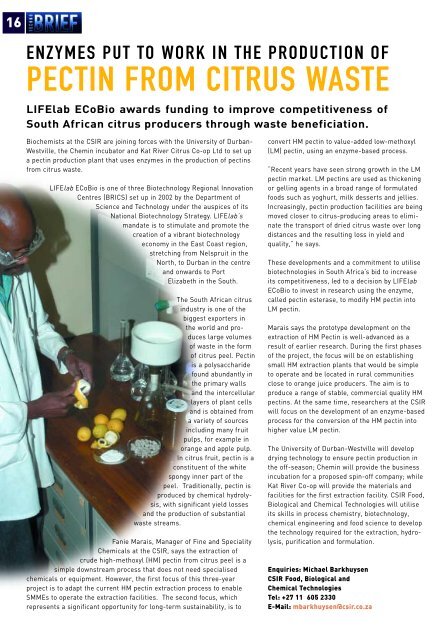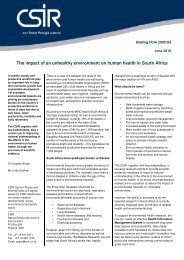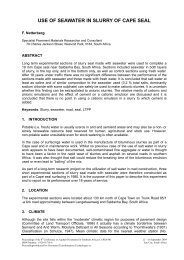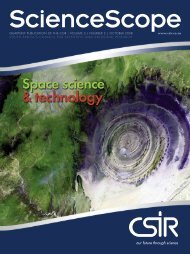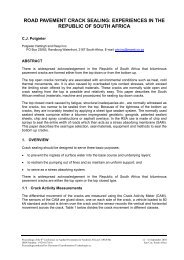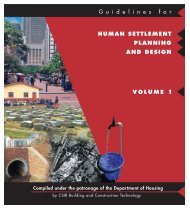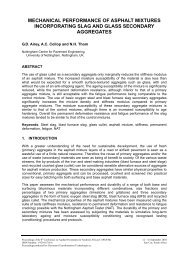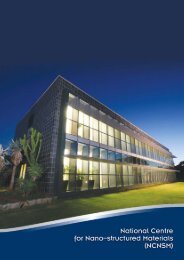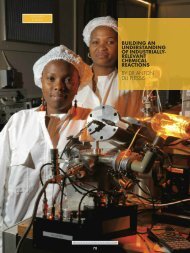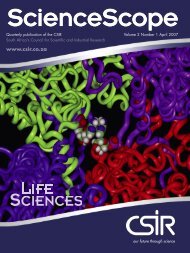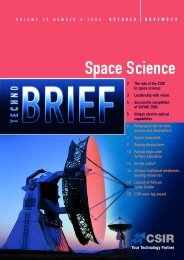16ENZYMES PUT TO WORK IN THE PRODUCTION OFPECTIN FROM CITRUS WASTELIFElab ECoBio awards funding to improve competitiveness ofSouth African citrus producers through waste beneficiation.Biochemists at the <strong>CSIR</strong> are joining forces with the University of Durban-Westville, the Chemin incubator and Kat River Citrus Co-op Ltd to set upa pectin production plant that uses enzymes in the production of pectinsfrom citrus waste.LIFElab ECoBio is one of three Biotechnology Regional InnovationCentres (BRICS) set up in 2002 by the Department ofScience and Technology under the auspices of itsNational Biotechnology Strategy. LIFElab’smandate is to stimulate and promote thecreation of a vibrant biotechnologyeconomy in the East Coast region,stretching from Nelspruit in theNorth, to Durban in the centreand onwards to PortElizabeth in the South.The South African citrusindustry is one of thebiggest exporters inthe world and produceslarge volumesof waste in the formof citrus peel. Pectinis a polysaccharidefound abundantly inthe primary wallsand the intercellularlayers of plant cellsand is obtained froma variety of sourcesincluding many fruitpulps, for example inorange and apple pulp.In citrus fruit, pectin is aconstituent of the whitespongy inner part of thepeel. Traditionally, pectin isproduced by chemical hydrolysis,with significant yield lossesand the production of substantialwaste streams.Fanie Marais, Manager of Fine and SpecialityChemicals at the <strong>CSIR</strong>, says the extraction ofcrude high-methoxyl (HM) pectin from citrus peel is asimple downstream process that does not need specialisedchemicals or equipment. However, the first focus of this three-yearproject is to adapt the current HM pectin extraction process to enableSMMEs to operate the extraction facilities. The second focus, whichrepresents a significant opportunity for long-term sustainability, is toconvert HM pectin to value-added low-methoxyl(LM) pectin, using an enzyme-based process.“Recent years have seen strong growth in the LMpectin market. LM pectins are used as thickeningor gelling agents in a broad range of formulatedfoods such as yoghurt, milk desserts and jellies.Increasingly, pectin production facilities are beingmoved closer to citrus-producing areas to eliminatethe transport of dried citrus waste over longdistances and the resulting loss in yield andquality,” he says.These developments and a commitment to utilisebiotechnologies in South Africa’s bid to increaseits competitiveness, led to a decision by LIFElabECoBio to invest in research using the enzyme,called pectin esterase, to modify HM pectin intoLM pectin.Marais says the prototype development on theextraction of HM Pectin is well-advanced as aresult of earlier research. During the first phasesof the project, the focus will be on establishingsmall HM extraction plants that would be simpleto operate and be located in rural communitiesclose to orange juice producers. The aim is toproduce a range of stable, commercial quality HMpectins. At the same time, researchers at the <strong>CSIR</strong>will focus on the development of an enzyme-basedprocess for the conversion of the HM pectin intohigher value LM pectin.The University of Durban-Westville will developdrying technology to ensure pectin production inthe off-season; Chemin will provide the businessincubation for a proposed spin-off company; whileKat River Co-op will provide the materials andfacilities for the first extraction facility. <strong>CSIR</strong> Food,Biological and Chemical Technologies will utiliseits skills in process chemistry, biotechnology,chemical engineering and food science to developthe technology required for the extraction, hydrolysis,purification and formulation.Enquiries: Michael Barkhuysen<strong>CSIR</strong> Food, Biological andChemical TechnologiesTel: +27 11 605 2330E-Mail: mbarkhuysen@csir.co.za
Celebrating100 yearsof safe minehoistingIn the face of growing health andsafety challenges, stringent governmentregulations and rapid transformation,the local mining industry hasone success record that it can lookback on with pride. Last year marked100 years of hoist rope testing inSouth Africa, which was celebrated ata centenary event held at theCottesloe testing facility of <strong>CSIR</strong>Mining Technology in November 2004.Vishnu Pillay, Director of <strong>CSIR</strong> MiningTechnology, explains that as depthsincrease, along with the demand forbigger and heavier payloads, ropetesting is an increasingly importantpart of mine safety. The <strong>CSIR</strong> currentlyruns one of only two hoist-ropetesting facilities approved by theDepartment of Minerals and Energy(DME) in South Africa, at its Cottesloelaboratory in Johannesburg.“The records of the DME show morethan 1 000 registered mines in SouthAfrica, of which an estimated 135 areunderground operations,” says Pillay.“The <strong>CSIR</strong>’s own rope databasereflects more than 1 150 hoist ropesin use, illustrating the responsibilitythat rests with our laboratory toprovide mine engineers with accuratetest data and results.”The statutory testing of mine hoistropes was introduced following thefailure of a winding rope in No. 2Shaft, Robinson Deep, on 25 April1904. This accident caused the deathof over 40 men and led to the immediateintroduction of a government regulationthat stipulated the periodicremoval of a section of head ropeadjacent to the skip, to be tested atthe Government MechanicalLaboratory of the Department ofMines.The Department of Mines relinquishedcontrol over the GovernmentMechanical Laboratory in 1964, whenit was taken over by the <strong>CSIR</strong> andincorporated into its NationalMechanical Engineering ResearchInstitute. This laboratory now formspart of <strong>CSIR</strong> Mining Technology andcontinues to conduct statutory testson mine hoist ropes and providerelated mechanical testing services.The largest tensile test machine inuse at Cottesloe is a 15 MN MFLmachine that was commissioned in1989. In addition to the testing ofmine hoist ropes, the MFL machine isable to accommodate large diameterwire ropes (~160 mm) as used in theoil drilling, bridge and shippingindustries. The capacity of the 15 MNmachine also caters for tensile testson conveyor belts up to 1.2 m wideand large-link chains, such as thoseused on coal mine draglines.The hoist rope tests evaluate a rope’sabsolute breaking force, mechanicalproperties, modes of wire and strandfailure, extent of corrosive and abrasivedamage, and the state of lubrication.If the results of the test showthat the rope does not conform to thecode of practice (SABS 0293, 1996),then the recommendation is that therope be discarded. The majority ofropes, however, only reach thiscondition following several yearsof service. The results of the test,a graphical history thereof and subsequentvisual examination of thetest specimen, are recorded on atest certificate supplied to the mine.In addition to the testing of minehoist ropes, the <strong>CSIR</strong> offers a rangeof other mechanical tests includingtensile, proof and compression testsof a broad range of mining andindustrial products.Enquiries:Andrew Peake<strong>CSIR</strong> Mining TechnologyTel: +27 11 853 4550Email: miningtek@csir.co.zaHoist rope fact fileSouth African mines hoist about280 000 people up and down mineshafts each day.The same mines hoist about10 million tons of ore every month.An eight-compartment 2 000 m deepshaft contains more than 16 km ofhoist rope.In the deepest shaft each hoist ropeis more than 3 000 m long.DME regulations stipulate that ropesinstalled on licensed winders mustbe tested every six months.Canada has adopted certain SouthAfrican standards relating to ropediscard criteria.<strong>CSIR</strong>’s hoisting and mechanicaltesting laboratory tests between2 000 and 3 000 ropes every year,including hoist ropes, scraper ropes,dragline ropes and ropes for marineapplications.The biggest specimen the centre hasever tested is a 153 mm diametersteel wire rope, which was locallymanufactured, and was to be usedas one element of a sling for anengineering application.The biggest steel wire rope usedfor mine hoisting in South Africa is63 mm in diameter, and weighs17 kg per metre. At a depth of morethan 2 000 m, the weight of this ropealone – without any skip or cageattached – is some 34 tons.Although mines sometimes experiencewinding accidents, they arerarely due to rope failure. Ropetesting allows mines to predict andprevent such failure. Testing alsokeeps costs down, as it helps minesto avoid premature replacement ofexpensive steel wire rope.The <strong>CSIR</strong> maintains the largestdatabase of rope tests in Africa,to ensure the traceability of allspecimens tested.17


